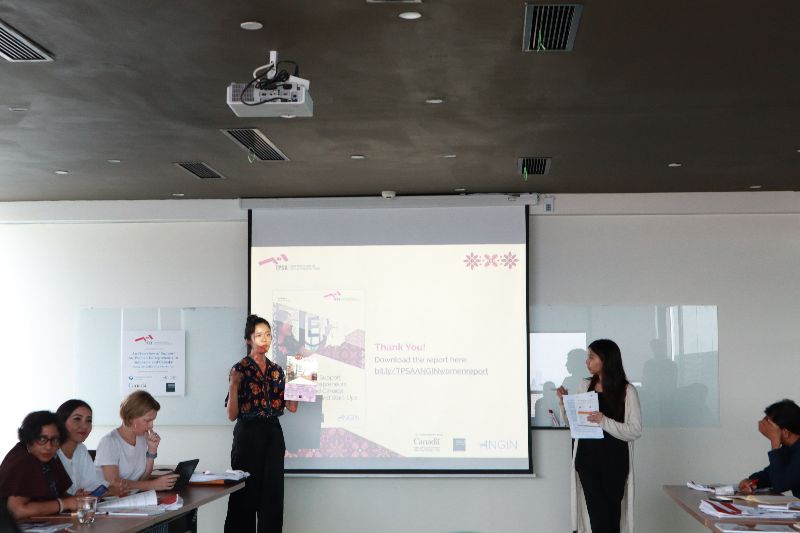Wednesday, March 27, 2019 – Jakarta, Indonesia // More than 30 women entrepreneurs, ecosystem players, policy makers, and changemakers came together to celebrate the launch of the Canada-Indonesia Trade and Private Sector Assistance (TPSA) Project and ANGIN’s latest report, titled“Overview of Women Entrepreneurs in Indonesia and Canada: Focus on SMEs and Start-Ups”. The report is a product of ANGIN Principal Valencia Dea, which was sponsored by the TPSA at The Conference Board of Canada (CBOC) in Ottawa from March to May 2018. The CBOC is the Executing Agency of the (TPSA) project in partnership with Indonesia’s Ministry of Trade and is funded by the Canadian government through Global Affairs Canada.
At the event, Valencia presented key highlights of the report, which discusses about the state of women’s entrepreneurship in Canada and Indonesia. The report identified various types of policies, programs, and financing solutions that ecosystem players in Indonesia and Canada have implemented to promote and support women entrepreneurs, particularly women in small and medium sized business (SME) and startups. Canada was selected as the country of comparison because of its extensive and varied programs that support and promote women entrepreneurs. The 2018 MasterCard Index of Women Entrepreneurs (MIWE) ranked Canada seventh out of 57 countries on the conditions that support women entrepreneurs. Indonesia, by comparison, ranked 30th.
According to the report, Indonesia’s stakeholders have been putting ongoing efforts to promote and support entrepreneurship in Indonesia. However, only a few of the interventions are addressing challenges and needs faced by women entrepreneurs. Some of the examples are Lembaga Kebijakan Pengadaan Barang/Jasa Pemerintah (LKPP)’s gender equitable procurement process (policy), Investing in Women’s Impact Accelerator Program (program), and SEAF Women’s Opportunity Fund (financing). The report believes that while there is a growing effort from Indonesian stakeholders to develop the country’s entrepreneurial ecosystems, plenty of room remains for specific and tailored interventions for women entrepreneurs.
“Empowering women entrepreneurs has been one of ANGIN’s core missions; therefore, we are very delighted to produce this study with the TPSA Project. In this report, we map out different type of policies, programs, and financing solutions to support women entrepreneurs in Indonesia and Canada. We are hoping this report would provide relevant stakeholders in Indonesia with some practical ideas on what policies and program models can be adopted to support women entrepreneurs,” Valencia said.
The event was followed with a moderated discussion, in which attendants shared their thoughts about what critical changes each stakeholder (i.e., academia, private sector, and government) should make to advance women’s entrepreneurship in Indonesia. According to Karyana Hutomo from the Binus University incubator program, actors in the academia need to change the university culture and encourage students to shift from passive study to active ventures into entrepreneurship. Meanwhile, BEKRAF Head of Public Fund Hanifah shared that a bank is bound by strict rules, what the government does to increase access to finance is by connecting entrepreneurs with alternative funding, such as ANGIN, and supporting the presence of these alternative solutions.
From CBOC in Ottawa, the TPSA Project’s Principal Gender Equality Expert, Lota Bertulfo, commented, “Canada has been in the forefront of promoting gender equality and women’s empowerment for many decades, both within the country and in its overseas development assistance. The TPSA Project aims to contribute to a more enabling environment in exporting for Indonesian women-led SMEs. Valencia’s report is a concise yet useful reference material for both Indonesian and Canadian stakeholders and could facilitate mutual learning between the two countries to create this more enabling environment.”
Read the report here.





